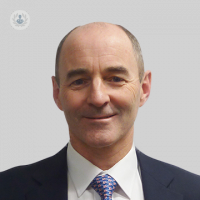Deafness: can hearing loss be reversed?
Written by:Hearing loss is a common problem that tends to come on gradually, where you may not notice any changes for a while. It often develops as we age or because of continual exposure to loud noises.
Do you need to listen to music with the volume turned up very high? Do you often have to ask people to repeat themselves because you have difficulty in hearing what they are saying? These are common signs of hearing loss!
Thankfully, top ENT surgeon, Mr Michael Pringle, is here to share his tips on how to improve your hearing and avoid deafness.

What are the types of hearing loss?
There are three types of hearing loss:
- Sensorineural - where the nerve part of the hearing system (the inner ear) doesn’t work as well as it used to. Sometimes known as nerve deafness. This is the hearing loss that happens to us as we grow older.
- Conductive - where something stops the sound from getting to the nerve part of the hearing.
- Mixed - a hearing loss with a nerve and a conductive component.
What causes deafness?
The common causes of nerve deafness are age and loud noise. Other causes include drugs, infection, trauma, tumour and genetics.
A conductive hearing loss can be caused by wax, infection, glue ear (fluid behind the eardrum), a hole in the eardrum, trauma, a problem with the hearing bones (missing or stiff), a cholesteatoma (a skin cyst in the ear) and otosclerosis.
What are the first signs of hearing loss?
The first signs of hearing loss are either needing the TV louder or having problems hearing people in background noise. High-frequency hearing is usually the first to go.
Many of the sounds in speech ‘sh’, ‘th’, ‘s’, ‘t’ are quiet and if there is any background noise you cannot hear which sound has been said. This makes it difficult to understand the speech even though you can hear it.
What tips can you give to improve hearing?
Look after your ears and avoid exposure to very loud noises, which can damage the hearing. Hearing loss can cause frustration, sadness and social isolation. The brain loses the stimulation it is used to and there is now a theory that this may be related to Alzheimer’s.
Your hearing loss can also affect your relationship with friends and family. Seek treatment early. Talk to your doctor as there is a lot that can be done to help treat hearing loss.
Can deafness be reversed?
A nerve hearing loss cannot be reversed but can be helped with a hearing aid or a cochlear implant if the hearing aid is no longer strong enough. A conductive hearing loss can often be reversed by treating whatever is stopping sound from getting to the inner ear. This may involve removing, replacing or repairing or bypassing whatever the problem is.
If you are concerned about your hearing, do not hesitate to book a consultation with Mr Michael Pringle today.


